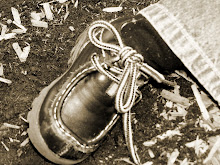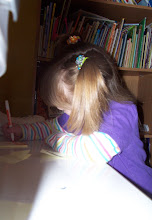Sunday, July 27, 2008
Perfectly Imperfect
One of the greatest gifts of humanity is that of imagination, the ability to look beyond the situation and see what could be, what might be, what is possible, or even what may see impossible but wonderful. Imagination allows all progress to occur, it allows for innovation and invention, it allows for creativity and art, it creates opportunity for reflection, it offers beautiful escapes. It shapes friends for young children, dream worlds, wishes that we hang upon stars, goals that we strive for, worlds that we long to create, and an ideal of how we can make a difference. Yet with imagination comes a darker side, the ability to look at a situation and imagine all of the possible different outcomes, to ask over and over the two word question that can rip apart the soul, "what if?". We can spend our entire lives imagining "what if" things had been different, "what if" one event had been changed, "what if" this or that had never happened. I used to imagine what my life would be like if I had been born healthy, with every gene perfectly in place and every cell programmed to work exactly as designed. "What if" I had never experienced repeated periods of severe oxygen deprivation as an infant? "What if" I did not have dysautonomia, juvenile onset SLE, ataxia, etc.? "What if?" I had not been the child that was always slower at physical activities, that sometimes actually wished that the hidden medical differences were somehow physically apparent so that others could better understand, that was intimately familiar with hospitals and doctors offices? In my heart I rebelled against "being different" and detested that which I felt made me so, even as I was drawn to and adored the differences in others. As I have grown older I have realized that trying to imagine my life without these characteristics is virtually impossible. It is like trying to imagine a world in which you exist but you are a stranger to yourself. From where I am now, I realize that in order to become the exact person that I am, in order to be able to offer the exact set of skills and insights in my work as a teacher and in my life, in order to have the appreciation of life and the awareness of its incredible fragility, I could not have traveled any other path. As strange as it may sound to anyone else, I am thankful for the exact experiences that I have had, for the exact way that God has made me, and for the fact that I was made perfectly imperfect. That does not mean that I do not become frustrated at times with the limitations of my body, with the seemingly endless medical tests and appointments and medications, and with the conflict between the desire of my heart and the function of my body. There are times when it seems overwhelming, or when it seems like almost any other way would be easier. But no other way other than the one I have already traveled could have lead to where I am now, to who I am now, which I would not sacrifice for anything. Even though the journey has been and most likely will be incredibly difficult at times, I can say with certainty that the views along the way are breathtaking, the companions you meet life changing, the wisdom you gain beyond expectation, and the destination worth any sacrifice. So instead of following my imagination along the endless loop of what if, I have discovered that I am incredibly thankful and proud of the fact that I was created absolutely perfectly imperfect.
Saturday, July 26, 2008
I prefer INtolerance
Over the past several years, schools and activism groups have grabbed firmly onto the concept of tolerance. The ideal is presented as creating a culture of tolerance, where all differences are recognized and accepted, where diversity is centered on tolerance of one another. We teach tolerance in schools as part of "diversity education", we preach tolerance from pulpits, we sell tolerance as a movement and an idea. At first this seems like a tremendous improvement in society, to create a culture where there is not open discord over differences, where there is no open exclusion based upon diversity, where everyone is welcome because of tolerance. However, there are significant undertones to the message of tolerance that I refuse to accept. Tolerance does not mean that individuals who do not meet the current social definition of "normal" will be appreciated for their differences, or valued for their unique abilities and insights, or treated with respect and dignity. All tolerance guarantees is that their presence will be allowed and accepted without open hostility and aggression. It does not guarantee that individuals will be viewed as having an equal purpose, equal value, equal worth in life but only that they will not be treated with forthright disrespect and scorn. The very use of the word tolerance suggests that those who are to be tolerated are less desirable, less worthy, less valuable than those who are tolerating them and that it is only through the grace and kindness of others that they are tolerated. For example, we appreciate fine works of art, gourmet meals, beautiful sunsets, symphony masterpieces. We tolerate bugs at a picnic, long lines for bathrooms at concerts, scorching hot cars in the summer time, and relatives who invite themselves for a visit and stay too long. No one wants to be tolerated. Tolerance should never be the goal we set, the message that we send as being what is appropriate. Instead we should be working towards creating a society where differences are not tolerated but valued, where there is no question about the intrinsic worth of a person regardless of how they may meet up to the standard societal definition of "normal" or "appropriate" and where diversity is not a buzz word but a natural part of daily life. I can not imagine why anyone would ever desire to limit themselves to just tolerating someone who is not identical to themselves when they could share with them, learn from them, and value each of their uniqueness.
Thursday, July 3, 2008
Rewriting the Bible
As part of the curriculum of the day camp, we teach the Bible twice a week in my classroom. Our lessons this summer are about the different names of God in the bible (i.e. Jehovah, Abba, Elohim). Apparently my kids are writing their own version of the Bible. Below are some of their personal adaptations.
* God's son? Now named Eve.
* Jesus? He is coming back to the city to visit each person who believes in Him and hang out with them.
* Abraham? That refers to Abraham Lincoln.
* When your sins are forgiven God puts them far away, like in a desert. (which totally explains Los Vegas)
* God loves everyone, but He loves some of us more than others.
* God created video games, swimming pools, candy, dirt bikes, televisions, and money. These are needs, not wants.
*God is everyone's Father, but we don't need anymore brothers or sisters. (quote - we were talking about God being everyone's father and the kids were talking about the idea of us all being brothers and sisters, and one boy said "No!! I don't want any more brothers or sisters!!")
* Drawings of Jesus are actual pictures of Him - apparently there were cameras 2000 years ago.
* God's son? Now named Eve.
* Jesus? He is coming back to the city to visit each person who believes in Him and hang out with them.
* Abraham? That refers to Abraham Lincoln.
* When your sins are forgiven God puts them far away, like in a desert. (which totally explains Los Vegas)
* God loves everyone, but He loves some of us more than others.
* God created video games, swimming pools, candy, dirt bikes, televisions, and money. These are needs, not wants.
*God is everyone's Father, but we don't need anymore brothers or sisters. (quote - we were talking about God being everyone's father and the kids were talking about the idea of us all being brothers and sisters, and one boy said "No!! I don't want any more brothers or sisters!!")
* Drawings of Jesus are actual pictures of Him - apparently there were cameras 2000 years ago.
Tuesday, July 1, 2008
What You Leave Behind
On some level I comprehended that you never realize the legacy that you may leave behind you in life. I recognized that from a first person perspective you can never appreciate the third person impact of an action, a word, a thought, a moment. Yet it did not really fully take a living form for me until this afternoon. This summer I am working as a teacher at an inner city mission where thirteen years ago (13 years ago!) I attended a program they have as a high school student for a week in the summer. I attended for a week two summers of my high school life, at the ages of 14 and 15. As I was sitting at the computer this afternoon writing an email to a friend in the guesthouse (dorm) of the mission, a man approached me and asked me if I was me (i.e. he sais "you're ___ aren't you."). He had been "security" and staff at the project 13 years ago (thirteen years ago!) and recognized me. How he remembered me from all that time and from all those different teenagers that passed through the program is completely and absolutely beyond my comprehension. Yet somehow I had made some sort of impact to the degree that looking at me now, as an almost 27 year old with my hair dyed a different shade of red and glasses instead of contact lenses and such, he instantly recognized me without me even speaking to him or knowing who he was before he knew me. I can not say what that impact was - I hope it was positive, and based upon his interaction with me I am pretty sure that it must have been (i.e. he was shocked and surprised but pleased to see me). So how something I said, did, or was 13 years ago imprinted itself upon someone to the degree that they would recognize me as an adult without any context or clues is an incredible feat that I do not fathom but am absolutely amazed by. It also leads me to want to live my life in such a way that if an action, word, or choice of mine were to again make such an impact on someone I could be confident that it would be positive and that I was leaving a legacy of value behind. I would rather be remembered for something small but significant, something that in its tiny way made a difference, for a thousand tiny moments, than for one grand gesture. A thousand tiny flames are far better than one blaze of glory that quickly burns out.
Subscribe to:
Comments (Atom)





